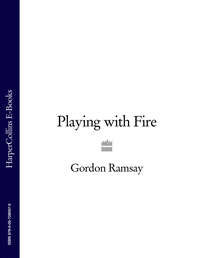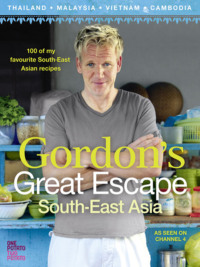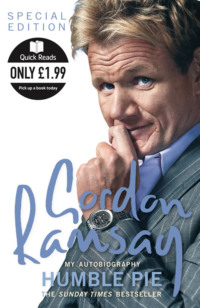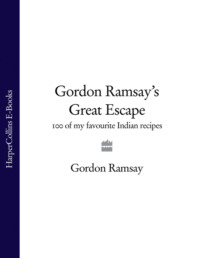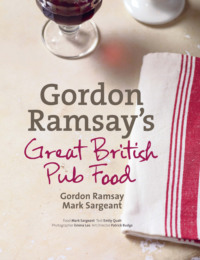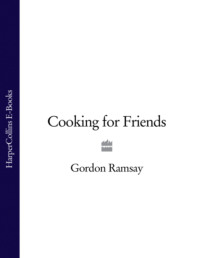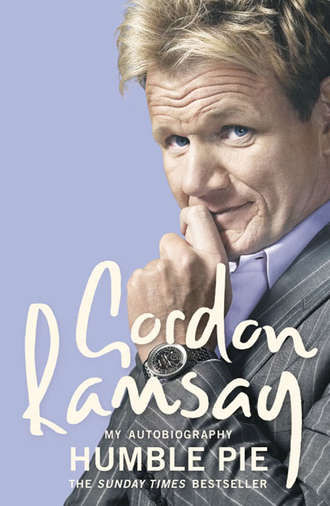
Полная версия
Humble Pie
That first week was hard. I didn’t have a good time at all. I had an English accent, for one thing, so basically they just kicked the shit out of me for that. And they also made me use my right leg, which was fucking useless. We weren’t allowed to rely on only one foot, in much the same way as, in the kitchen, you must be able to chop with both hands. I’m naturally left-handed, but I can chop and peel with my right hand so if I cut myself, I’m okay – I’m prepared. Anyway, after that first week, I came back and I just hated Rangers. I hated the guts out of them. I had no problem with the training – I’ve never been afraid of hard work – but then, in the afternoons, after training, we had gone on to play snooker and eat for Britain. Food in Scotland was bad, then – unbelievably bad. It still is, in most cases. It was pie and gravy, pie and beans, or what the Scottish call a ‘slice’ – these big, square, processed slabs of sausage meat. Fucking hell. I didn’t have what you’d call a sophisticated palate, but I couldn’t stand it. And although I was in digs, with the other lads, I was very lonely. I wished I had a Scottish accent, something that would have made them feel more comfortable around me.
‘I was born in Johnstone, and Mum and Dad moved south,’ I kept trying to tell them. ‘But my gran and my uncle and aunt all live in Port Glasgow.’
They, of course, weren’t having any of it.
I suppose after that first week up there, I thought I’d really fucked it up. I was called back three times. The process was horrible, and I was in two minds about begging for a fucking contract out of Rangers. I was settled in Banbury in the flat with Diane and I’d started a foundation course in catering and it was going well, and there was this feeling, deep inside me, that something else was bubbling up. I was starting to get excited about food. Also, though Mum and Dad’s relationship was really going pear-shaped, they had moved back up to Scotland, and I was enjoying my freedom. I had my first serious girlfriend, I’d started working in a local hotel, I had a bit of money, and there was always Banbury United if I wanted football. I got about £15 a game. I wasn’t complaining. Still, I was just waiting for that call.
Mum phoned. She told me to contact my Uncle Ronald: he had some good news for me about Rangers. So that was what I did. ‘Look, things have moved on,’ he said. ‘I told you they were going to watch you, and they have, and they’re going to invite you back up.’
He gave me a number to call. It was for one of the head coaches. I couldn’t understand a word he was saying: he was speaking far, far too fast. But finally he said: ‘We want you back up. Can you bring your Dad to training on May seventeenth?’
I thought: oh, shit. At that point, I was barely speaking to Dad. I wasn’t even allowed to call the house. The trouble was that the first people the club want to talk to are your parents. They want to know that you’ve got security at home, that you’re properly supported. I was thinking: fuck, am I properly supported? No. I’m sixteen, and I’m living on my own, fending for myself. I rang Mum and asked her to tell him. I couldn’t face doing it myself.
So she did tell him and, all of a sudden he was…I don’t know. Not nice, exactly, but smarmy. He was excited now. I guess he had his eye on the main chance. He was going to live vicariously, through me. How did I feel about this? Wary and nervous. I knew he was drinking; I knew he’d been horrible to Mum; I knew what Yvonne had been through. The only thing that kept me going was the fact that Dad had promised to buy Mum a house – the first time he’d ever suggested such a thing. I hung on to that promise for dear life. I picked up on that one tiny moment, and managed to convince myself that he must have got his shit together at last. Still, it all felt so false – everyone pretending to be best mates, Dad and my uncle suddenly being so involved in my life. I had to live at home again, and take Dad to training with me every day. Being back there, I knew that things weren’t at all right. I felt it instantly. It was almost like Mum and Dad were staying together for the sake of my future at Rangers. I couldn’t bear that. It was pressure, massive pressure. It wasn’t as though I was in love with Dad and he had this amazing relationship with Mum, and all I had to do was concentrate and play football. I was worried. It was all so precarious – a house of cards that could tumble down around my ears at any moment.
This time, the training was going exceptionally well. I started playing in the testimonial games, and I was included on the first-team sheet, which was amazing. It was great, turning up to meet the bus when we were playing away from Ibrox, standing there waiting in your badge and tie, all spruced and immaculate as if you were off to a wedding. It was such a thrill. Outside the stadium, you’d be signing things like pillow cases and the side of prams, and families would turn up with their kids to have their trainers signed. Of course, they didn’t know me from Adam. They didn’t have a clue who I was. I was never a famous Rangers player because I was a member of the youth team. But, on the other hand, I was part of a squad that was doing well. The team has such a following that if you’re wearing the gear – you’re in, and that’s that.
I played for the first team twice, but only in friendlies, or pre-season. In those days, Ally McCoist had just broken into the first-team squad – we still know one another now, though for different reasons, which is really weird – and Derek Ferguson was captain of the under-21s. But it was a bad time for me, stars or no stars. Dad’s duplicity was really getting to me. Then they said: ‘We’re going to continue watching you. We’re really excited. We are going to sign you – but it’ll be next year rather than this.’ Well, that was tough. I knew I was going to go back – how could I not – but by this time, I’d been offered a cooking job in London. Somewhere, I’ve still got the letter offering it to me. It was a new 300-seater banqueting hall that had opened at the Mayfair Hotel called The Crystal Room. They were looking for four commis chefs: second commis, grade two. I don’t know what the fuck that means, even now – it’s a posh kitchen porter, basically. But the salary was £5,200 a year. Anyway, I told them that I wasn’t available to start and went back up to Rangers for the third year in a row.
This must have been the summer of 1984. Half the players weren’t there because they were travelling in Canada, so everything was much more focused on the youth players. Basically, they were deciding who was staying, who they were going to sign that year. Coisty was there, and Derek and Ian Ferguson, whose contracts were well under way. They’d been involved with the club since they were boys, and I suppose that’s all I ever really wanted to do, too: to stay put in one place, and play football, and become a local boy.
But if you’re trying to make it in one of the best teams in Europe, and you don’t even sound Scottish, you’re like a huge, fucking foreigner. Luckily, I was getting big and strong and I could just about handle myself. The training went very well, this time. I remember playing in a reserve team game against Coisty. They always used to hold back two or three first-team players, and then they’d give the inside track about what you were like on the pitch. I had a good game. I was hopeful. I was feeling positive.
The following week, we were playing a massive testimonial in East Kilbride. I couldn’t believe it. I was in the squad, and I got to play. There must have been about 9,000 supporters at the game. The trouble was that they kept moving me around the pitch, playing me out of position. First I was centre back. Then I played centre mid-field, where you’ve got to have two equally strong feet, and you have to be able to twist and turn suddenly. I was really pissed off, and then, just to make things even worse, I got taken off fifteen minutes before the end. They must have made at least seven different substitutions that day. Never mind. I trained for another two weeks, and then I played in another youth team match. Another really, really good game. I was starting to think that I might be in with a chance.
Then, disaster. The pity of it is that my football career effectively came to an end in a training session – one of those bizarre training accidents where you barely realise what it is that you have done. I smashed my cartilage, seriously damaging my knee, and stupidly, I tried to play on. There had been one of those horrendous tackles that makes you even more determined not to give up. I would do whatever I was asked to do, no question. We went on to take penalties with our right foot. I’ll never forget it. We had to put a trainer on our left foot and a football boot on our right. The idea was to make your right foot work constantly. So first there was a penalty competition and then, afterwards, we had to take corners with our right foot. It must have been nearly four o’clock when they finally said, right, we’re going to divide into two teams of eleven and play fifteen minutes each way and I want you all to give it everything you’ve fucking got. By this time, we’d been training all day. Well, that was a big mistake. By the time we finished, I was in a serious amount of pain.
Afterwards, I should still have been resting up, but I tried to get back into the game too quickly. I was out for eleven long weeks, getting more and more paranoid, terrified that someone else would take my place on the bench. But no sooner was I up and running again than I played a game of squash. That was a really dumb thing to do. I tore a cruciate ligament during the game, and was in plaster for another four months. I was worried that I wouldn’t regain my match fitness. Once the plaster came off, I started training again like a demon. But I was still in a lot of pain, though I tried to ignore it. After training sessions, I would spend hours in hot and cold baths, trying to ease the pain, to reduce any swelling. Deep down, I think I knew I was in trouble, but I pushed those kinds of thoughts to the back of my mind. I would tell myself: maybe all players are in this much pain. Or: maybe I can work through it. I was determined to put in a third appearance for the first team, and in order to do that, I had to ignore the message my body was trying to send me.
But come the start of the new season, there was no getting away from it. My leg was just not the same, and this had become apparent to my bosses. Jock Wallace, the club’s manager, and his assistant, Archie Knox, called me into their office one Friday morning to give me the bad news. It was all over for me. I was not going to be signed. I was not going to play European, or even first division football. I remember their words coming at me like physical blows. It was so hard to take. But I was determined not to show how broken I felt inside. Years of standing up to Dad had put me in good stead for this performance. I might have wanted to cry, or to shout, or to punch the nearest wall, but I was damned if I was going to in front of these two. I admired Jock and I had always been intimidated by him. I certainly wasn’t going to let the side down now. I gripped my chair, and waited for the whole thing to be over. In those few minutes, all my dreams died. Part of me was wondering how I would manage to walk out of the room.
They suggested I do more physio, and maybe sign with a different club, one in a lower league. So did my father. In fact, he was pathetically eager that I take this advice. I don’t think he could bear to lose sight of the dreams he had had for me. He wanted the good times to roll. He wanted to be able to boast to his so-called friends, who had always been so much more of a success in life than him. Dad was sitting in his van just outside the ground when Wallace broke the news to me; going out there and telling him was one of the toughest things I have ever done. But I wouldn’t let him have the pleasure of seeing me cry, either. On and on he went: ‘You carry on badgering Rangers,’ he said. ‘You prove to them you are fit again.’ But far harder to take was his lack of sympathy for me. He didn’t have a single kind word for me that day, not even so much as a gentle pat on the shoulder. Later on, he even suggested that I might be exaggerating the extent of my injury. So I went home, shut myself away, and had a good cry. I couldn’t face seeing anyone. I suppose I mourned for what might have been. But I was also certain that I had no future in football. Scrabbling around playing games here and there and working some other day job to pay the bills wasn’t for me. I wanted it all, or I wanted nothing. No matter how much promise I had shown, I was always going to be labelled as the player with the gammy knee. I had to let go of the game that I loved. That was hard because I had come so close to making it, and I felt bitter for a long, long time afterwards. But I was certain that I was doing the right thing in making a clean break: I had the example of my father and his so-called music career to encourage me, didn’t I? There was no way I wanted to be a pathetic dreamer like him for the rest of my life. The very idea disgusted me. I wanted to be the best at whatever I did, not the kind of guy that people secretly laughed at behind his back. I needed a new challenge. The only question was: what would that be?
Looking back on this time, I’m struck, once again, by the cruelty of my father, and the way he dominated everything I did, even my football. I loved the game. But my involvement wasn’t about becoming a famous player with flash cars and flash houses and women hanging on my every word. It had so much more to do with proving myself to my father. I remember one night, when he was very drunk, he said to me that he used to think that I was gay when I was a little boy. I will never forget that. What is striking to me about that now is that he was so full of hatred for the idea that I might be gay; I couldn’t help but wonder why the idea made him feel so threatened. What was his problem?
The film Billy Elliot has an amazing resonance for me. I remember going to see the musical version of it on stage in London with Tana. Fucking amazing. There was a moment – you can probably guess which one – when it took me straight back to my bedroom, to Dad being furious with me and accusing me of being gay. It moved me so much that I could hardly swallow for twenty-four hours. I know that world, where things are so hard. Mum trying to bake bread because we hadn’t even enough money to buy a loaf; us all depending on fucking powdered Marvel milk for months and months on end. No wonder I was so fucking thin. You never forget all that, and when you see the same kind of life up there on the big screen, you have one flashback after another. Not to be self-pitying, but it can leave you in pieces.
Of course, going into cooking probably got Dad thinking all that crap about my being gay all over again. He always thought that any man who cooked had to be gay – and he wasn’t alone. When I started out, this country had no culture of great kitchens. It wasn’t like France – cooking was a suspect profession for a man. You may as well have said that you wanted to be a hairdresser.
When I first started working in a kitchen, I kept the two worlds – football and food – as far apart as I could. One night, when I was at Harvey’s, Coisty came in for dinner with Terry Venables. I didn’t say a word to anyone. I didn’t want the other cooks to know about my life at Rangers, and I didn’t want anyone connected with football to see me in my whites. It seems bloody silly now. But back then, it felt like a matter of life and death. What a long way I have come.
CHAPTER THREE GETTING STARTED
GROWING UP, THERE wasn’t a lot of money for food. But we never went hungry. Mum was a good, simple cook: ham hock soup, bread and butter pudding, and fish fingers, homemade chips and beans. We had one of those ancient chip pans with a mesh basket inside it, and oil that got changed about once a decade. I loved it that the chips were all different sizes. She used to do liver for Dad – that was the only thing I refused to eat – and tripe in milk and onions; the smell of it used to linger around the house for days and days. Steak was a rarity: sausages and chops were all we could afford. We were poor, and there was no getting away from it. Lunch was dinner, and dinner was tea, and the idea of having a starter, main course and pudding was unimaginable. Did people really do that? If we were shopping in the Barras, and we decided to have a fish supper, we children all had to share. There was no way we would each be allowed to order for ourselves. Later on, when Mum had a job in a little tea shop in Stratford, she’d bring home stuff that hadn’t been sold. We regarded these as the most unbelievable treats: steak-and-kidney pies and chocolate éclairs.
We were permanently on free school dinners. That was terrible. It used to make me cringe. In our first few years, of course, none of the other kids quite cottoned on to what those vouchers were about. But higher up the school it became fucking embarrassing. They’d tease you, try to kick the shit out of you. On the last Friday of every month, the staff made a point of calling out your name to give you the next month’s tickets. That was hell. It was pretty much confirmation that you were one of the poorest kids in the class. If they’d tattooed this information on your forehead, it couldn’t have been any clearer. So yes, I did associate plentiful food with good times, with status. But I’d be lying if I said I was interested in cooking. As a boy, it was just another chore. My career came about pretty much by mistake.
I latched on to the idea of catering college because my options were limited, to say the least. I didn’t know if the football would work out. I looked at the Navy and at the Police, but I didn’t have enough O levels to join either of them. As for the Marines, my little brother, Ronnie, was joining the Army, and I couldn’t face the idea of competing with him. So I ended up enrolling on a foundation year in catering at a local college, sponsored by the Rotarians. It was an accident, a complete accident. Did I dream of being a Michelin-starred chef? Did I fuck! The very first thing I learned to do? A bechamel sauce. You got your onion, and you studded it with cloves. Then you got your bay leaves. Then you melted your butter and added some flour to it to make a roux. And no, I don’t bloody make it that way any more. I remember coming home and showing Diane how to chop an onion really finely. I had my own wallet of knives, a kind that came with plastic banana-yellow handles. At Royal Hospital Road, we wouldn’t even use those to clean the shit off a non-stick pan, let alone chop with them. But we were so proud of them – and of our chef’s whites. I treated my knives and my whites with exactly the same love and reverence as I used to my football boots. I sent a picture of me in my big, white chef’s hat up to Mum in Glasgow. I think she still has it. I was so fucking proud.
Meanwhile, I had a couple of weekend jobs. The first was in a curry house in Stratford – washing up. The kitchen there wasn’t the cleanest place in the world, and they worked me into the ground. Then, in Banbury, Diane got me a job working in the hotel where she was a waitress. Again, I was only washing up, but that was when I first got the idea of becoming a chef. I was in the kitchen, listening to all the noise, and I was fascinated. I couldn’t believe the way people were shouting at each other. I was working like a fucking donkey, but the time used to fly by. I was enraptured.
After a year, one of my tutors suggested to me that I start working full-time, and attend college only on a day-release basis. I’d made good progress. That said, I was by no means the best kid in the class. In college, you can spot the students from the council estate, the ones who are basically middle-class, and the ones whose parents are so in love with their daughters that they send them to cookery school. God knows why. There are three tiers, and you can spot them a mile off. I was in the first group. I didn’t get distinctions, and I wasn’t Student of the Year. But I did keep my head down, and I did work my bollocks off. I pushed myself beyond belief. I was happy to learn the basics. I didn’t find it demeaning at all.
So I started work as a commis at the place where I’d been washing up: the Roxburgh House Hotel. The dining room was pink – pink walls, pink linen – all the waiters were French and Italian and all the cooks were English. My first chef was this twenty-stone, bald guy called Andy Rogers. He was an absolute shire horse. The kind of guy who would tell you off without ever explaining why. Dear God, the kind of food that he encouraged us to turn out. I shudder to think of it. The cooking was shocking, the menus hilarious. Take the roast potatoes. They started off in the deep fat fryer and then they were sprinkled with Bisto granules before they went in the oven, to make sure they were nice and brown. Extraordinary. The foie gras was all tinned.
We used to serve mushrooms stuffed with Camembert. One of the dishes was called a scallop of veal cordon bleu. It was basically a piece of battered veal wrapped around a ball of grated Gruyère in ham. I knew it was all atrocious, even then. I was getting all this information at college, and I would come back and try to apply it. I’d say: ‘You know there’s a short cut. To make fish stock you should only cook it for twenty minutes, otherwise it will get cloudy, and then you should let it rest before you pass it through a sieve, or it will go cloudy again.’ For this, I would get roundly bollocked by the chef. He didn’t give a fuck for college.
I stayed for about six months, and then I got a job at a really good place called the Wickham Arms, in a small village in Oxfordshire. The owners were Paul and Jackie, and the idea was that I would live above the shop, which was a beautiful thatched cottage. Unfortunately, things went pear-shaped there pretty early on. Jackie was in her thirties, I must have been about nineteen, Paul was away a lot; perhaps you can imagine what was going to happen.
Paul was mad about golf, and he loved his real ale. So he’d be off down to Cornwall, in search of these wonderful kegs. I had a serious girlfriend at the time, I’d met her at the college but she was going off to university. So that didn’t stop me. Basically, I was in charge of the kitchen, and a 60-seat dining room, and I wasn’t even properly qualified yet. I was making dishes like jugged hare and venison casserole and doing these amazing pâtés, and just reading endless numbers of cookery books. Locally, everyone loved the food, and it became a kind of hot spot. But I guess that went to my head: I was on my own, completely free, no one checking up on me. I was all over the fucking shop.
One day, while Paul was off on one of his trips, Jackie rang down to the kitchen. ‘Can I have something to eat?’ she said.
‘What would you like?’
‘Just bring me a simple salad, thanks.’
So I got together a salad with a little poached salmon and took it up.
‘Jackie, your dinner is ready.’
And she opened the door – stark bollock naked. I put the tray down, and went straight into her bedroom.
For the next six months, I led a kind of double life. There was Jackie, my teacher, and Helen, my pupil. You know what it’s like when you’re young. It’s awkward and clumsy. Sometimes, at least before I met Jackie, I used to feel that sex was like sharpening a pencil. You stick it in there, and grind it around. But Jackie was teaching me all these things, and it was amazing. The trouble was that Helen got some of the fringe benefits, which meant that she was falling more and more in love with me.
At first, Paul would only be away for a couple of days at a time. Then he started going on golfing trips to Spain for more like a week. That’s when it all got too much. It was getting heavy. Fucking heavy. Jackie told me that she loved me. The truth is that I loved making the jugged hare more than I did having sex with the boss’s wife, but the only reason I was in a position to buy and cook exactly what I wanted was precisely because I was shagging her. Things weren’t exactly going to plan and it was all getting too nerve-racking for me: that he might notice, that we might get caught, the fact that she was always telling me she was in love with me. So I told them that I was leaving to go and work in London. She went bananas.


